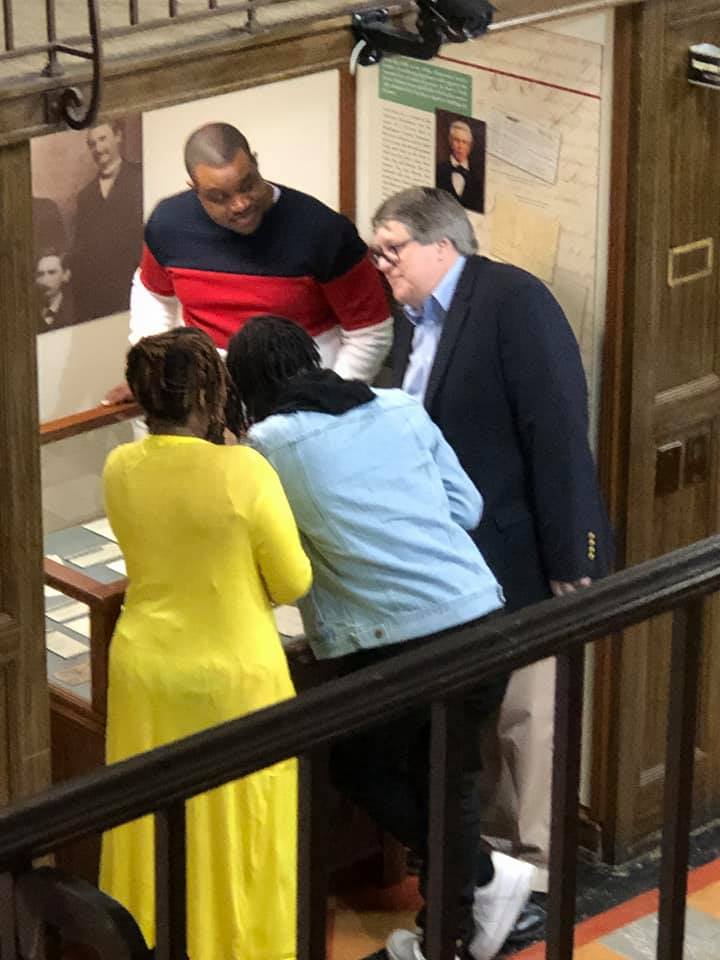The Tennessee Judiciary Museum and Court of Appeals Judge Andy Bennett were featured recently on a new NBC program that helps families uncover interesting stories about their past.
In this episode of Roots Less Traveled, St. Louis resident Sharee Burress and her son DeVonn travel to Nashville where they learn that one of their relatives was a key player in a famous and consequential 19th century Tennessee Supreme Court decision. In Nashville, the mother and son meet Judge Bennett at the Tennessee Judiciary Museum where he shows them an exhibit dedicated to the case of Ford v. Ford.
As it turns out, Sharee’s great-great-great-grandfather was a man named Larkin Ford. In 1840, Ford was a slave living in Washington County and was owned by American Revolutionary war veteran Loyd Ford. That year, Loyd Ford drew up a will giving his slaves their freedom and his land after his death. When Loyd Ford died in 1843, his slaves sought to probate his will. His children, in turn, contested the will.
The case went to trial in Washington County Circuit Court in 1845. The jury found that the will was valid. Loyd Ford’s children appealed to the Tennessee Supreme Court.
In its 1846 decision, the Tennessee Supreme Court sent the case back to circuit court for retrial, but included in its opinion language from Justice Nathan Green attesting to the humanity and the rights of slaves. Justice Green wrote that “a slave is not in the condition of a horse or an ox…[He]e is made after the image of the Creator…He has mental capacities and an immortal principle in his nature that constitute him equal to his owner but for the accidental position to which fortune has placed him.”
Back at circuit court, a jury again found that the will was valid, a decision upheld by the Tennessee Supreme Court in 1850. As a result, Larkin Ford and his fellow slaves were freed and granted Loyd Ford’s property.
Sharee and DeVonn grew emotional as they learned about their ancestor’s fight for freedom.
“I am so proud to be able to go to my reading students and be able to explain to them that my family and some good people were able to change history,” Sharee, a reading instructor, said on the program.
“If he would have given in, we probably wouldn’t be where we are today,” DeVonn said. “You have to keep fighting.”
Judge Bennett was happy to share the moment with the Burresses.
“You have a history to be proud of and to build on,” he said.
The remainder of the program followed Larkin Ford’s personal history from the time he won his freedom through his selection as a Republican delegate at a political convention in the 1870s. At the end of the program, the Burresses travel with host Faruq Tauheed to Washington County where they visit the area once bequeathed to their ancestor.
“I look at this land and feel like my four-times-great-grandfather is definitely looking through my eyes,” DeVonn said. “This is truly amazing. It’s inspirational.”
Judge Bennett later reflected on the experience of filming the series.
“Their ancestor’s story is a fascinating one,” he said. “The Court’s treatment of enslaved persons was very unusual for a pre-Civil War southern state. The story really affected them emotionally. The film crew was devoted to telling the story in the right way. It was a great experience I will never forget.”
Roots Less Traveled is co-produced by Ancestry.com and airs at 9:30 a.m. Central Standard Time on Saturdays on NBC. The episode can be viewed online here.
The Tennessee Judiciary Museum is operated by the Tennessee Supreme Court Historical Society and is located in the Tennessee Supreme Court building in Nashville. It was founded in 2012 to celebrate the building’s 75th anniversary. Additional photos from the museum on the day of filming can be seen on the Tennessee Judiciary Museum’s Facebook page.

